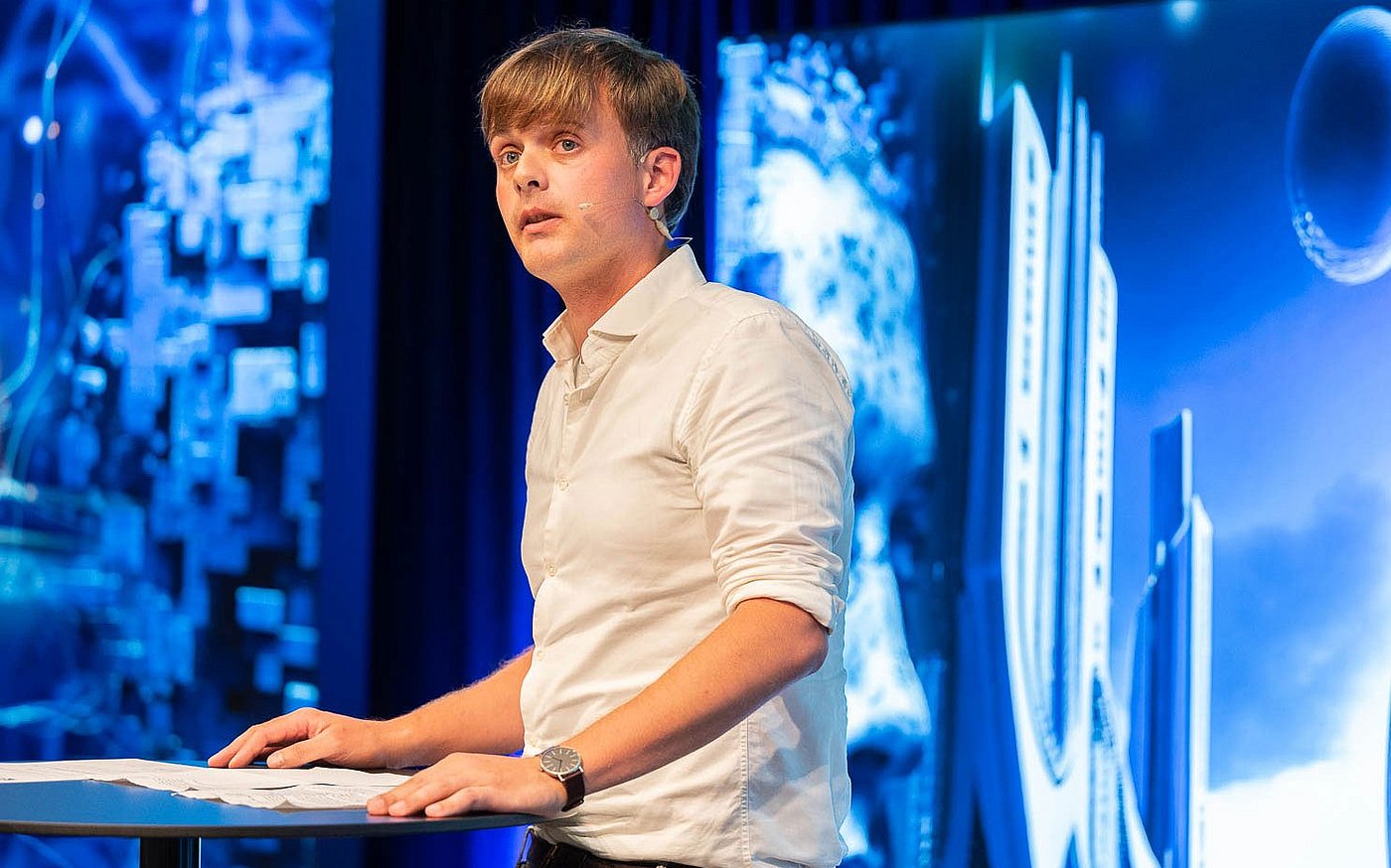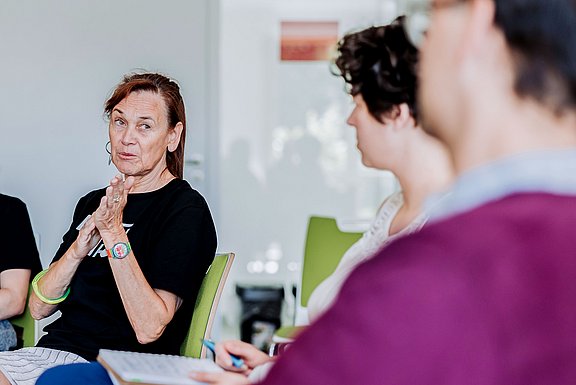Do we need to rethink the economy? - Interview with Dr Andreas Lingg about his book "Die Entdeckung der Wirtschaft" (2023)
For a coffee with: A series of talks with interesting personalities from the UW/H environment.

"Economy must become more complex."
Professional Campus: Dear Andreas, you work at the WittenLab. Studium fundamentale at Witten/Herdecke University (UW/H). As head of thesieben-viertel.deproject, you build an important bridge between the university and urban society. You are also involved in the transformation project [tra:ce]. How did you come to "discover the economy"?
Andreas Lingg: As an economic philosopher and historian, I have dealt a lot with the history of knowledge - especially the history of economic knowledge. One question that occupied me for a long time was: What does capitalism do to associates? In the present, such a question cannot be dealt with clearly.
That's why a historical review was helpful. At some point, I came across a situation that we in Germany can mark quite precisely.
The initial spark for capitalist economic activity in Germany, alongside long-distance trade, was above all mining in the late Middle Ages.
Professional Campus:Did this location play a role - after all, Witten is considered the cradle of mining in the Ruhr region - or was it pure coincidence?
Andreas Lingg:I recently joked that you had to deal with mining in Witten! But my approach was completely different. In the late fifteenth century, something crystallised that seemed to me to be an overarching theme. Whether in mining, seafaring or the pursuit of colonies - in a way, various manifestations emerged at the time that were linked to a new theory of space reclamation. There was a growing hope that the world was not a constant volume, so to speak, but that it could be increased, gained, expanded. This meant that a region unsuitable for agriculture could suddenly become interesting for mining.
Professional Campus: From today's perspective, why is it so important to visualise such ideas as they emerged in the early Renaissance - especially from an economic and social perspective?
Andreas Lingg: It's a legacy that we're still nibbling at today, because this reclamation of space came at the cost of something: for centuries, we financed it through credit - on the people we exploited to gain the world, as well as on nature. You could say that these debt relationships are catching up with us today in many respects. For the first time in modern history, people believed - or wanted to believe - that natural resources were renewable and therefore inexhaustible. It was a completely new discourse of infinity that was used to reclaim space and exploit the earth.
Professional Campus: This new discourse seemingly emerges as part of an identity-finding process; something like: the British own seafaring, the Germans own mining?
Andreas Lingg: The two correlate, because we are in a phase where nation-statehood is slowly emerging as a concept. Up until the eighteenth and nineteenth centuries, the following mantra persisted among German-speaking economists: What can the German-speaking world do better than other, competing countries within Europe? Extract treasures from the earth! And indeed, the exploitation of earthly resources has played a central role in this country for centuries. The praise of mining was correspondingly prominent within the economic theory of the time.
Professional Campus: Based on representations such as the cover image of your publication, among others, you show how a new kind of infinity from the depths of the earth becomes tangible. What role do representations play in our understanding of economics today?
Andreas Lingg: ...an interesting question to which I don't have a clear answer. There is definitely a connection, for example, between the emergence of hidden object images as an iconographic stylistic device and the regional implementation of capitalist forms of organisation. After the medieval "ordo" (a society of order in which everyone had a fixed place), areas of land and living spaces in constant movement increasingly emerged within Europe - a society of constant swarming and particularity, in which new dynamics could and had to be created and flow balances maintained. With regard to the question of representation, it is striking that economics developed an interest in quantification at an early stage - for example through figures, tables and lists. Soon, the image no longer appeared to be a suitable medium for capturing capitalist economic activity. With the Physiocrats at the latest, a kind of model-like thinking was established that still characterises economic theory today. From then on, lists and quantified numerical notations were well suited to capturing capitalist thinking in representations - instead of the static image space.
Professional Campus:An expansive, almost limitless economic space soon emerges. But today we are subject to limitations - starting with planetary boundaries. Do we need to rediscover the economy? Is it the end of infinity?
Andreas Lingg: I don't think we can avoid rediscovering the economy. The sixteenth century discovers four fantasies of inexhaustibility. One of them is the inexhaustibility of Mother Earth; that is the main concern of my latest publication. In central and northern Italy, the idea of infinitely refinable human arts emerges. In the French-Calvinist discourse on the Atlantic coast, for example, the idea of an eternally evolving world emerged. This idea was used in particular as a legitimising formula for colonisation. Land seizures and encroachment on foreign habitats were justified by the supposed benefits and progress that one's own presence would bring to the indigenous population. The fourth discourse can be illustrated in Flanders in particular: Namely, the idea that man has infinite needs - which in turn promised an infinite space of commercial or mercantile operations. From today's perspective, these four formulas are problematic in different ways. Some discourses can continue virtually unhindered, others cannot - the idea of eternally refinable arts, for example, does not hit such a hard limit as the question of resources.
Professional Campus: Currently, academia is trying to accompany transformations - for example with the Transformation Centre [tra:ce] at the Faculty of Management, Economics and Society. How can we continue to develop economically and still take into account the finite nature of available resources? Are "degrowth" or a "subsistence economy" the solution?
Andreas Lingg: With regard to the current situation, I would say that many of the modern-day institutions that surround us today are not only based on growth narratives, but have made growth part of their own functioning. In other words, growth is not, and not even primarily, an economic problem, but part of a wide range of social processes and areas.
And precisely because so many modern political forms and institutions are based on growth, I tend to maintain growth horizons and at the same time capture them in circular patterns. Growth spaces can be removed from modern linearity in order to be integrated into circular forms - for example through recycling or sharing.
Professional Campus:Do you see [ tra:ce], the Centre for Sustainable and Just Transformation, as an experimental space?
Andreas Lingg: It is both an experimental space and a way of placing certain topics in our university and making them visible. It's about reflecting on research methods, for example. Only in this way can new dimensions, such as planetary dimensions, become part of our own thinking and research.
Professional Campus: On the keyword planetary dimensions: According to Latour, we should think and act as if we were in lockdown - because we can't escape this planet. That doesn't sound particularly appealing... What does it take to rethink things?
Andreas Lingg: After the idea of infinite resources, the narrative needs to be rewritten. On the one hand, these limits will become apparent very quickly. I hope that we as a society will initiate new courses of action, if possible on a voluntary basis, and look at new horizons - before planetary facts force us to do so. I don't dare say whether we will succeed. In any case, it is important that large sections of society are involved - that we manage to do this together. That's why I'm sceptical about Bruno Latour on one point: in relation to ecology, I don't think that the economy should be a subservient, subordinate element. We're dealing here with an artificial opposition that is by no means necessary. I also believe that it is important to recognise that the fulfilment of material desires and dreams will remain important for many people. In future directions, ideally anticipating planetary boundaries, it is important that material wellbeing and economic opportunity are considered as part of a new equation.
Professional Campus:The UW/H has seen itself as a place of experimentation since its foundation. At the same time, social responsibility has also played a central role for forty years. Does the UW/H have a special role to play in view of current challenges?
Andreas Lingg: The UW/H - like all other universities - can play an important role. After all, the mode of doing business that has brought us to the current situation is very much based on the fact that certain things, forms of experience and knowledge have been included, while others have been excluded. Universities can and must create new states of blending here. This classically concerns the tailoring of textbooks - for example, when planetary units are included in Economics, Management, Art or Philosophy... All areas are in demand!
The university can play a key role here at various levels. The social reach of the university into society, its "third mission" beyond teaching and research, is a particular concern of mine.
Professional Campus: That brings us to your project seven quarters... Do you see it as another experimental field? What is the idea behind it?
Andreas Lingg: I see the sieben:viertel as an opportunity to create new mixing spaces. A kind of social alchemy in which people from different areas (for example from administration, civil society or business) come together in a new encounter under certain conditions. I have no claim to what should emerge. It would only be our role as scientists to direct this to a limited extent. What makes me happy in this process is to see that something is happening with people.
Professional Campus:Can you explain in more detail what specifically happens there? What kind of meeting spaces can be created as a result?
Andreas Lingg:The project comprises a whole series of seminars, held and planned with organisations from Witten and the region, which make current challenges part of the teaching. Students and citizens can deal with these topics together. One concrete example: the Günnemann-Kotten, an old farmstead in Witten-Rüdinghausen. For around three semesters, students have been working together with citizens to imagine and help design a new centre there - for self-sufficiency with vegetable growing, for example, but also as a meeting place and part of neighbourhood life.
Professional Campus: What does shaping the future mean to you? And how could a sustainable rediscovery of the economy take place?
Andreas Lingg:In order to be sustainable, the economy must become more complex. Business must break with the short horizons and the large number of hidden dimensions that have characterised and guided economic activity for centuries. In a way, the economy must be able to reckon with more. In other words: with social and planetary consequences. In order to be able to calculate more, we are all called upon to do so. We need new mission statements and discourses, new narratives - narratives that show us social spaces for play and development that are not at the expense of the planet. But we also need new technologies. For example, there is the possibility that A.I. can play a positive role if processes can suddenly count on more and remain economical at the same time. Social, but possibly also technical dimensions play an important role in the future of the economy.

The transformation centre of the UW/H, [tra:ce], as an experimental space.